The Anatomy of a "Bad Boy" Part I: What Defines a Bad Boy?
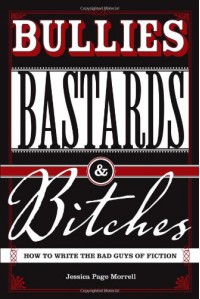
This post (part of an ongoing series) is somewhat inspired by me picking up
Let me be clear, there used to be a time that I actually liked the image of the "bad boy" in many dimensions of fiction. But I feel like there are so many different definitions (or maybe even misconceptions) of what a "bad boy" really is. I also think that there are times when the "bad" of the bad boy tends to overshadow the character with just how far on the scale of morality it presses upon, and that can be a huge, huge problem.
The definition that I thought of what a "bad boy" entailed, does not match up with what is considered a large and disturbing trend that's carried forward in recent literature. I'll get into the details of the trend later, but right now I want to focus on some descriptors for definition.
When I think of the image of the bad boy, I do think of characters with the following traits:
- Usually mischievous
- Usually self-confident (not always cocky, but can be), but there are some exceptions to this rule
- Regardless of personality typing, are considered "bad influences" by some peers or run with crowds that are unpopular or socially stigmatized
- Usually have a backstory which makes it possible to sympathize/empathize - sometimes this can be very heavy or a series of heavy situations. It may not necessarily be overbearingly heavy or melodramatic, but enough to elicit strong emotional ties to and from the character.
- Have a penchant for getting into problematic situations, whether by their own devices or outside influences
- Usually with no more than three fatal flaws (at most!!)
- Usually with at least one or two characteristics that makes them redeemable/likable in spite of those flaws (note: physical attractiveness is not included in this set, as it's not a factor that's redemptive)
- Usually charming to the opposite sex (or depending on the novel you're reading, may be open to varieties of various sexual persuasions)
- Can be considered good-looking or physically/mentally attractive to a certain subgroup (you can have the renegade bad boy, the goth bad boy, the jock bad boy, the lazy bad boy, etc. Take your pick. A different flavor for every book/genre you would think, but it seems like in more recent considerations it's become more homogenized.)
These are just a few descriptors off the top of my head, and most of them are general - not necessarily universal. Now I can think of many "bad boy" characters I've encountered in various media, and in different mediums. I'm going to start with one for example: Ryo Saeba, one of the main characters from the long running manga and anime, City Hunter.
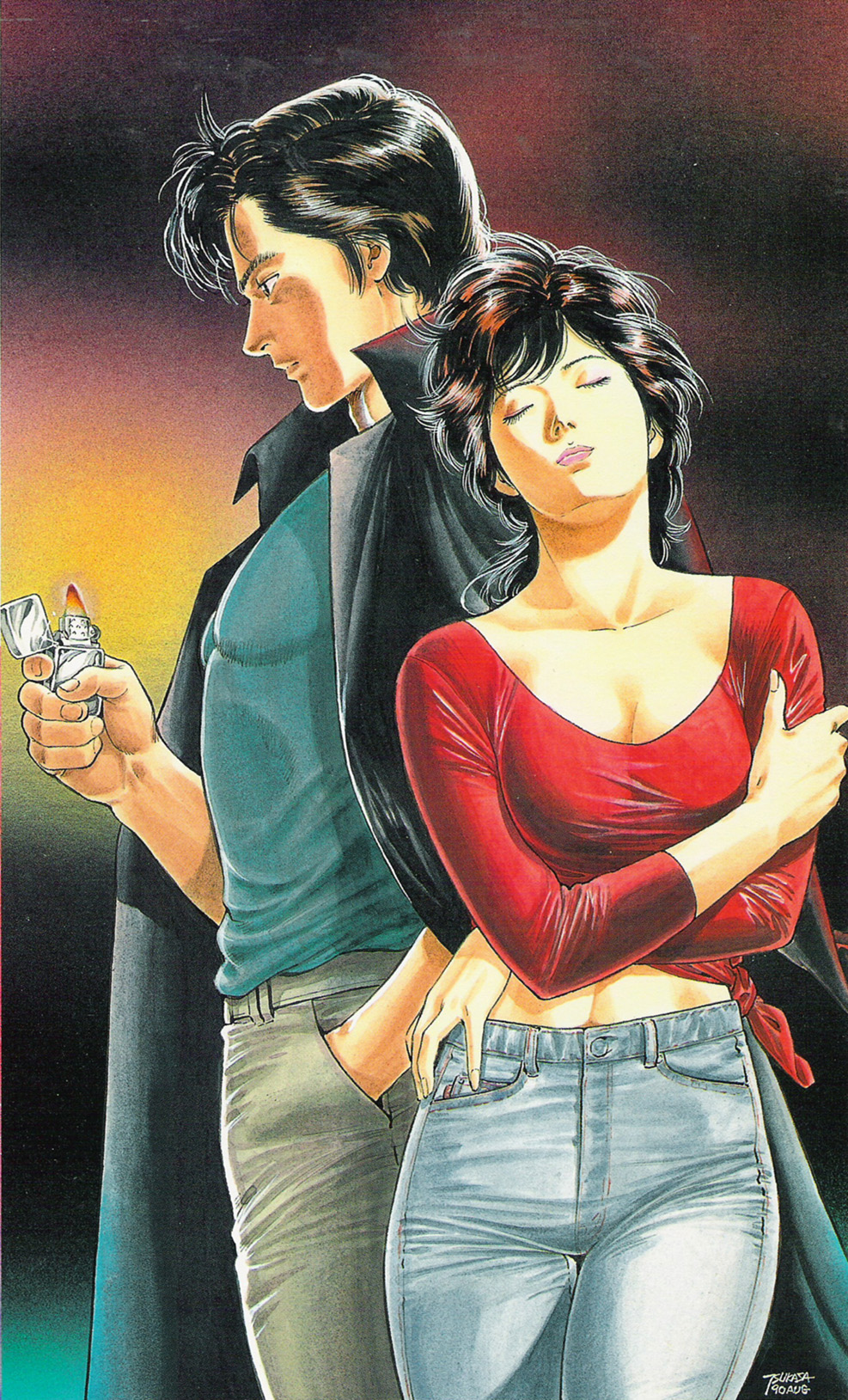
Ryo Saeba's pretty much known as a something of a classic anime character in some (actually many) circles. He can do everything. He can shoot a bad guy with a single, well-timed bullet. He can jump in and save a drowning girl and somehow earn her respect by the end of an episode. With men, he's a "man's man" as a private detective - a technical pro, master of his trade, has traveled the world and seen his share of the extraordinary. He's admired by women for his "good looks" and seemingly persuasive charm and bravery in the heat of a risky situation/moment of peril. His protectiveness in moments of peril for his clientele usually is a strong selling point in terms of how people gravitate towards his character.
Even at the beginning of the series, when his longtime partner is killed and he has to take care of his former partner's little sister (Kaori, who later becomes his partner in more ways than one), Ryo manages to be sympathetic and has moments where he has reveals of tragic revelation and backstories that shape his character. And his emotions are genuine in terms of his sense of duty towards those he befriends and protects.
Even Jackie Chan has played this dude. Jackie Chan, man.
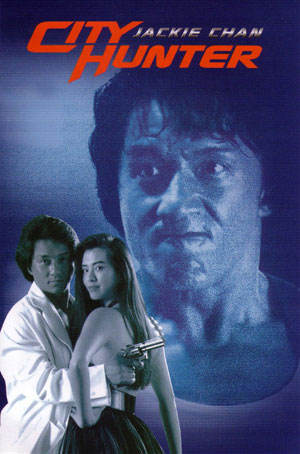
The problem with Ryo Saeba? Well, he's a bonafide pervert - that's his one (arguably) fatal flaw. And he's seemingly happy go lucky while he's being a pervert. I mean, if you count the number of times he starts shouting "Mokkori!" (which is usually coupled with a perverse action, the origins of the term mokkori are as such) during an episode of the TV series and either admiring a woman's leg or groping boobs - or insinuating groping boobs, you're likely to come across a ton of examples, ad nauseam. Sure, he gets the 10K hammer treatment upon his head (usually courtesy of his partner Kaori) when he treats a woman like a prize to be won, but to say it's problematic? Well...
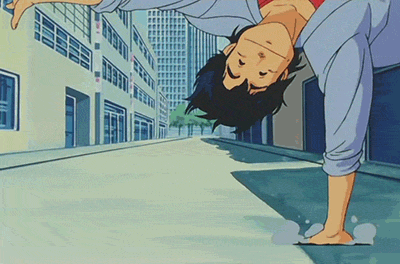
So why the heck did I end up liking this dude? (For better and worse)
He's a surprisingly well developed character, despite his constructions in various terms that are cliches (or maybe the fact that he may be a character who was a source for those cliches). Maybe his development might be a result of the number of manga volumes, anime episodes and various media spinoffs he's been featured in. They may have some of the same running gags privy to the characters contained, but somehow it works. I'm not going to deny that because Hojo Tsukasa (the creator of City Hunter) made this James Bond/Miami Vice smorgasbord of a hero, and his humor is self-aware, sometimes charming depending on the situation. Is it cliched? Yep. Is it problematic? Considering just how much the series manages to get away with, even for its time, yep. But he manages to create a character who has redeemable qualities, but has qualities that are well worth the tag of "like to hate" at times.
I think my like (and introduction) of Ryo Saeba came with one of the spinoff series for City Hunter: Angel Heart. This was a series that was very hit and miss for reaction for long time franchise fands because it killed off a major character (Kaori) and placed a what-if situation in which Kaori's heart was placed in the chest of a young, emotionless female assassin. The series then explored how this young assassin came into the company of Ryo and the usual gang, and how the assassin came to have a "heart" and new perspective on life from Kaori's spirit.
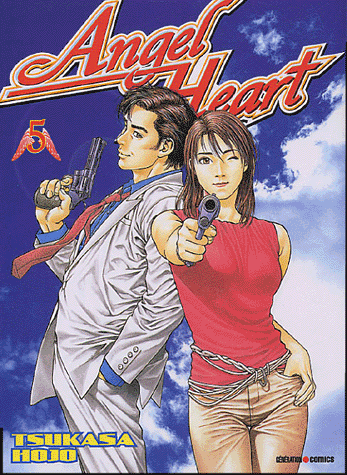
I actually loved this premise and further loved the manga and anime adaptation. I think the fact I hadn't been a long time viewer/reader of the City Hunter franchise helped ease me into that series, before backtracking and watching the City Hunter series in the main TV anime, movie versions, and drama. Ryo's character did show quite a bit of growth - showing him with more paternal instincts and more emotional resonance with respect to the losses in his life (especially with some insights to his relationship with Kaori when she was alive). But you can still see the definition of the character in some familiar gags and nods to the original series.
So, is he a "bad boy" type? Yep, I think of him as such. He fits many of the characteristics I mentioned earlier. But is he the only type of bad boy? Nope.
Take another known character in many circles, this time from a little series called "Supernatural". (grossly understated)
Hello Dean Winchester.

Dean's an attractive character both in appearance and personality. The appearance is kind of self-explanatory (*coughs*), but his personality attracts a lot of people in ways too. His sense of humor, his loyalty to his brother, his taste in music (dude...), various personal quirks (Jensen Ackles does a good job with conveying some of the various emotional reactions Dean's character has). His backstory also attracts a lot of people considering how he got into hunting demons and various creatures of the supernatural persuasion. But he's not a perfect character. He's been through Hell and back (literally and figuratively). He has more than one fatal flaw (various prejudices, secrets, etc.), but he also has enough redeemable characteristics and motivations, even when the situations the character faces and the way he encounters them become very...complicated. I think Supernatural in itself has characters that have some semblance of flaws and likable characteristics (you can see this in Sam, Bobby, Castiel, etc.) through each of the different seasons, and it's a popular show.
Would I consider Dean a bad boy character? Yep, especially since he meets many of the characteristics I listed above.
There are a lot of examples from books and media on characters that are considered bad boys, but I feel like there are many definitions that tend to focus on just one *type* of bad boy. The alpha male simply being "alpha" (whatever people may think that entails), the cocky "man's man" who can do anything and everything, the white heterosexual male who readers or TV viewers fall head over heels for just because he's "cute" despite the fact he might indulge in things that are considered problematic by habit or situation, but really - isn't that limiting the definition of what a "bad boy" is and why/how they're considered attractive?
A "bad boy" isn't limited to one single characteristic, no more than any other character. You can create an alpha male character, but defining him as an alpha doesn't mean he's a well developed "bad boy" that's going to attract a reader or peruser of media. Just having a good looking guy doing continuous problematic things with no motivations won't either.
If we're talking about what makes a "bad boy" attractive, it's usually characteristics that may define a well developed anti-hero, or a well meaning hero who may be shaped by a combination of problematic behaviors/habits with circumstances that have identifiably shaped or elicited those behaviors. It can be many things, but it's never usually one. Really the key thing that should be considered is knowing the motivation and development behind these characters and remembering to keep them in mind and presentation. Sometimes it's the adrenaline rush that comes from the character being in a genuinely tough situation - for morals or physical/mental/emotional peril. Sometimes it's the moment where that character, after engaging in so many problematic measures for a while, has a revelation or series of revelations that prompt him to change his ways. I wouldn't say this is limited to an affectionate relationship, but it can be (too often, people defer to the "love heals all" trope and that's unfortunate because there's so many more dimensions that shape people or characters for their behaviors and motivations for things).
I sometimes feel like so many people focus on making the "bad boy" character just one thing, or follow in another person's cookie cutter imaging that they forget that a "bad boy" has to have his own motivations and background to shape him, and that there are more than just one set of measures that may make him attractive to audiences. If you limit a "bad boy" for attraction to just one set of descriptors, you're only going to attract people who like that particular descriptor set. Others will either get tired of seeing that same template, or won't be brought into that character's experience because of its singular dimension.
My next entry's going to deal with how bad a "bad boy" character can be, and that's probably where the bulk of my criticisms are going to lay, but I'm crafting this particular entry just to start the conversation, and provide some food for thought on a common presentation in literature and various media. I may provide an extension for this first topic later, though, if I think of anything else that may help in shaping the definition of what a "bad boy" is and what various sources make of that.
Cheers,
Rose
 14
14
 6
6







